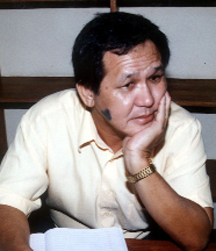Acting Chief Justice Ian Chang yesterday ruled that the High Court has jurisdiction to investigate the internal proceedings of the National Assembly on grounds that a constitutional breach has occurred.
In the light of the ruling, Justice Chang asked lawyers for Opposition Leader David Granger and Speaker Raphael Trotman to either answer the Attorney General’s constitutional motion on the composition of key parliamentary committees or argue the merits of the case.

While lawyers for Trotman said they would not be filing an answer, those representing Granger said they needed time to consult other members of their legal team on how to proceed and the case was adjourned to today.
Attorney General Anil Nandlall earlier this month moved to the court to contest the make up of the committees, arguing that the representation of the parties must be based on the proportionality of seats won at last November’s elections.
Speaking moments after yesterday’s hearing, Nandlall said that in the light of Friday’s sitting of the National Assembly, where members of the opposition would seek to make changes to the numerical composition of other committees, he was hoping to conclude the case as quickly as possible.
Nandlall, who announced two additions to his team, including former town clerk Beulah Williams, stated that one of the contentions against his action, made by attorney Nigel Hughes, was that the Attorney General is not the proper authority to bring the proceedings before the court. He, however, said that despite Hughes’ charge that it is a matter of the state suing the state, no constitutional, statutory, or judicial authorities were cited to support the argument.
Nandlall emphasised that he is complaining about a constitutional violation. “The fact that the AG is the principal legal adviser to the government, he is the protector of the public’s interest and the protector of the constitution,” he said, adding that he must be clothed with the “authority and requisite standing to initiate proceedings when constitutional breaches occur.”
He added that there was nothing in the law that “disables” the Attorney General from lodging a complaint that one officer of the state performing constitutional duties has violated the constitution, noting that that both Granger and Trotman, in their various capacities, hold constitutional offices and as a result have certain responsibilities.
Nandlall, saying that the question of the separation of powers does not arise in the case, maintained that he was only challenging the actions of Granger and Trotman in the National Assembly, while arguing that the constitution is being violated in a manner that doesn’t take into account the 26,000 votes from the last elections. “This must qualify as a matter of public interest and importance. It relates to the franchise of 26,000 votes by important functionaries of the National Assembly,” he said.
PPP/C members have argued that in reconfiguring the number of seats on the Committee of Selection to nine—with the government members having four, APNU four, and AFC one—the opposition has disregarded the ruling party’s higher vote count at the elections. Although the PPP/C won the most votes to secure the presidency, APNU and AFC combined have a one-seat advantage in the National Assembly.
Jurisdiction
Chang pronounced on the court’s jurisdiction to investigate the internal proceedings of the National Assembly after lengthy submissions by Nandlall. He explained that the ruling is in the light of accepted principles, noting that the authorities presented indicate that the court has authority to investigate on the grounds in cases of a constitutional breach. He said that if there is no constitutional breach, it automatically means no jurisdiction and he added that the preliminary points presented in court needed to be addressed before he dealt with the merits of the case. All the lawyers for the respondents were assured that even though the ruling was made, they will have the opportunity to respond to the points raised by Nandlall.
Attorney Basil Williams, speaking on behalf of the lawyers for Granger, indicated that he would need time to consult with his colleagues. He later explained to reporters that the reason behind his request for a deferral was the fact that Senior Counsel Rex McKay, who is the lead attorney for Granger’s legal team, was not present in court. “We have been contending on the face of the document filed by the AG that it discloses no constitutional breach. We believe that that is sufficient to find lack of jurisdiction,” he, however, said.
Khemraj Ramjattan and Roysdale Forde, who are appearing for Trotman, said that they would not be filing an affidavit in answer. “The AG has failed to highlight any constitutional breach so we will not be filing anything,” Forde said, later telling reporters that he is convinced that the application filed by the AG is completely misconstrued. “We are convinced that the court ultimately will make such a ruling,” he said, adding that he did not see a case against his client and it is just a matter of time before the court reaches the same conclusion.
Forde said there is no indication of the actions committed by the respondents.




